‘Unlimited, disrespectful and excessive’ – is the party over for tourism in Ibiza?
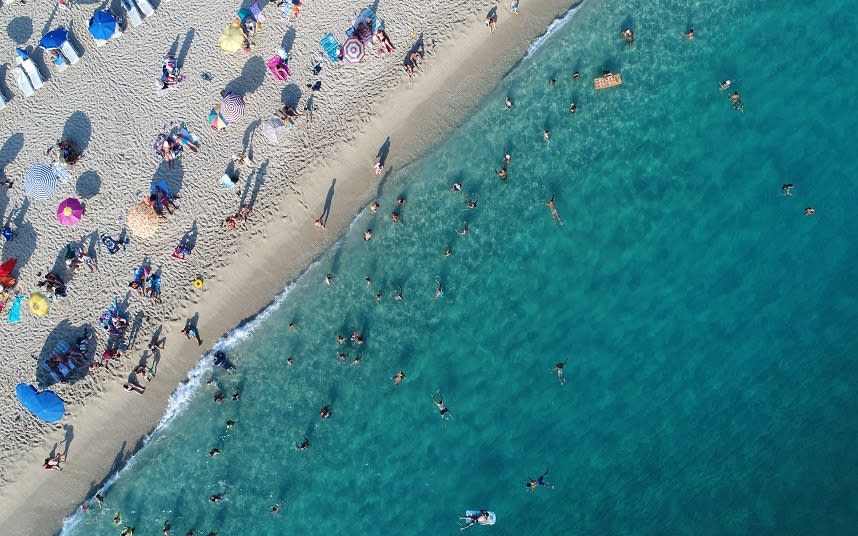
More than 500 people have taken to the streets to protest against the impact of overtourism in Ibiza – the first rally of its kind on the Balearic island famed for its hedonistic 24-hour lifestyle.
The rally, organised by local pressure group Prou!, took place on Vara de Rey in Ibiza Town last Friday. Protesters decried the privatisation of beaches, party boats, the rise in crime, the increase in rental prices and noise pollution. Some held placards reading “For Sale”.

Speaking at the event, the director of Prou!, Àngels Escandell, said: “We don’t reject tourism but we do reject tourism which is unlimited, disrespectful and excessive.”
On the group’s Facebook page, they set out their agenda, stating: “We want to return to the peace and quiet of the traditional Ibiza.” They list environmental degradation and anti-social behaviour as symptoms of mass tourism on the island.
In 2017 Ibiza received 3,236,360 tourists, a five per cent rise on the 3,061,895 that visited in 2016. Brits make up the majority of incoming tourists, followed by Spanish and then Italian visitors.
While total tourist numbers are up, the latest year-on-year figures actually represent a slowdown in the growth of tourism in Ibiza, with French and German tourists slowing by 12 per cent and 6 per cent respectively. Britain’s growth has slowed from 7.8 per cent between 2015 and 2016 to 4.7 per cent in the last year. The only country to see a year-on-year growth in the percentage increase in visitors was Spain.
But three million visitors is still a considerable number for an island with a population of just 130,000. So what is being done to curb any negative impacts of tourism on the island?
This year, a new law has been introduced banning Airbnb and other accommodation platforms like HomeAway from listing rooms in private houses and apartments in Ibiza Town, meaning the only available accommodation on the site are hotels and licensed properties. Other areas in Ibiza including Santa Eularia des Riu, San Jose and San Antonio have implemented similar bans.
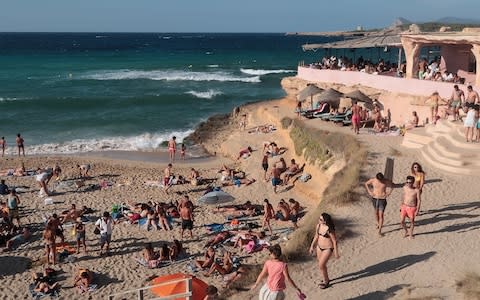
Moves have been made to curb noise pollution, too. Councillors representing one of the island's most popular clubbing spots, San Antonio, have introduced a Special Acoustic Protection Zone – this will bring the curfew of clubs back from 5am to 3am, and open-air bars will need to shut by midnight.
The tourist board has also made steps to address the impact of tourism on the island, with its new 'Love Ibiza' campaign focusing on sustainable travel.
Launching the campaign at the Berlin tourism trade fair (ITB), the president of the Island Council and the department of tourism Vicente Torres said: “Tourism has been the key to the development of the island, we cannot survive without tourism, but at the same time we must provide steps towards sustainable development," reported local paper The Ibizan.
"Residents, visitors, businesses, workers, and first of all the institutions of the island, must all come together in an understanding of the need to preserve the landscapes, coastlines, monuments and culture of the island. Tourism in the 21st century is a tourism that respects and values the place it visits. It is a tourism that does not degrade the destination, but instead it contributes in a positive way.”
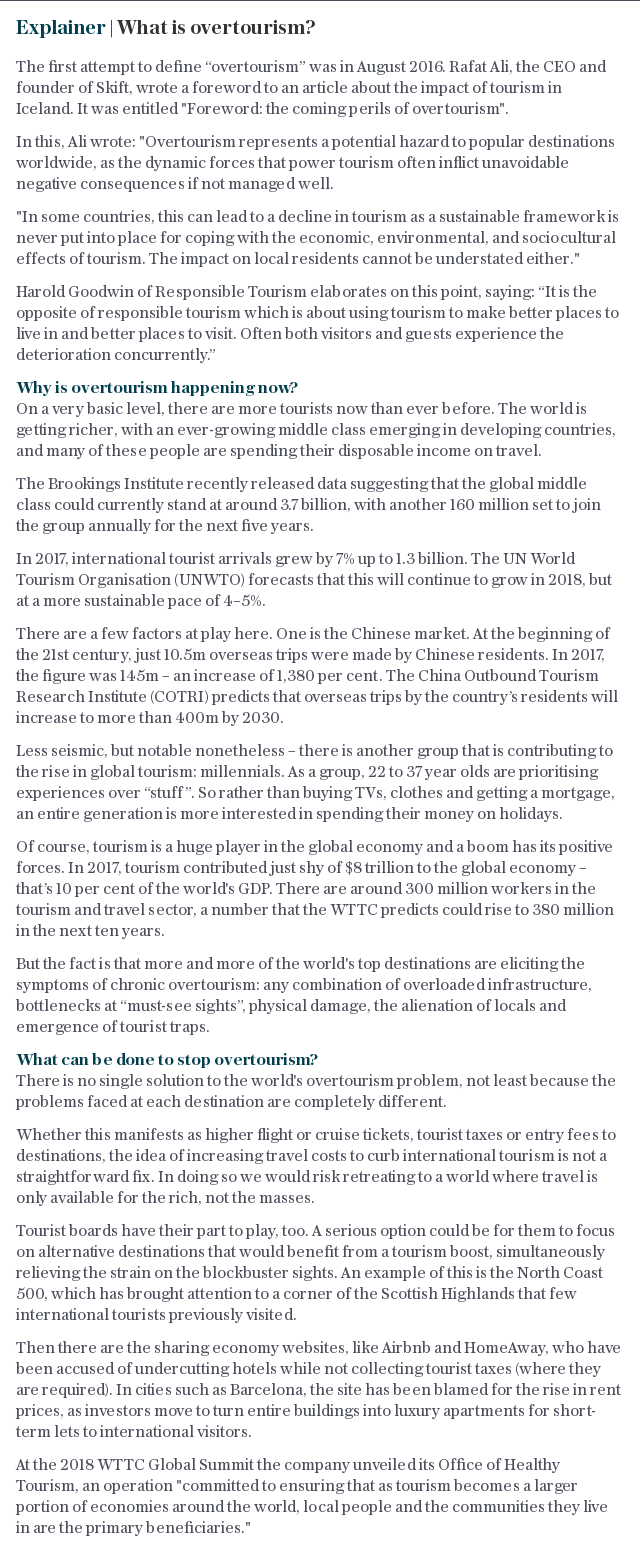
Telegraph Travel's cruise editor and regular visitor to Ibiza, Teresa Machan, offers a reality check on what it's like to visit the island. "In Ibiza, like other popular tourist destinations, there are pockets where the uglier side of mass tourism is visible," she said.
"But even in San Antonio, throbbing heart of the Ibizan club scene, measures are being taken to alleviate the effects of overtourism and to clean up the streets where bars are concentrated. Elsewhere on the island you can find plenty of tranquil places to enjoy the scenery, swim at a relatively empty beach, detox, eat quality food in a stunning outdoor setting and drive without traffic hassles. It is the ultimate 'dip in and out of' holiday."
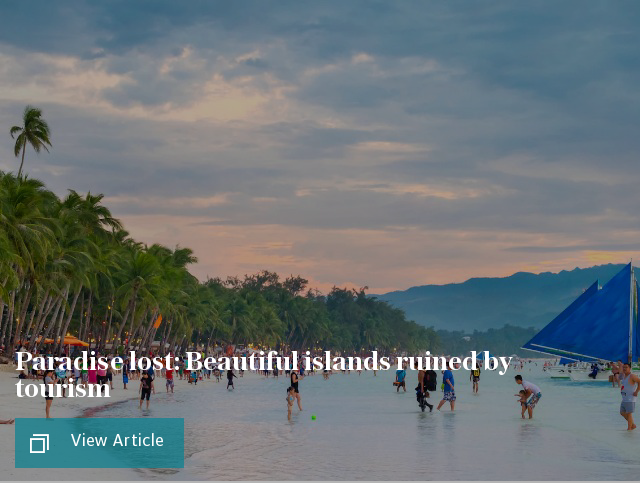
Ibiza is not the only Spanish destination to take measures against the impact of overtourism.
With more than 10 million annual visitors and as many as 500 annual cruise ships depositing 22,000 people a day, Mallorca is feeling the strain of its popularity. The capital Palma was the scene of an anti-tourist protest last September, with demonstrators demanding holidaymakers “go home”.
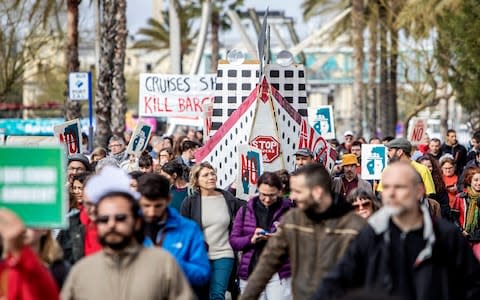
Local authorities are well aware of the problem and are trying to fix it by doubling the tourist tax during peak season. Raising the levy to as much as €4 (£3.50) per person per day, depending on the type of accommodation used, will help fund ecological projects, they say, as well as encourage holidaymakers to visit out of season. Other proposed measures have included tougher restrictions on Airbnb and a ban on tourists arriving by car.
Barcelona has also seen intense debate over the impact of tourism in the city. With more than 32 million annual visitors, tensions bubbled over last summer when a group of masked men stormed an open-top tourist bus, slashing the vehicle’s tyres and spraying "El Turisme Mata Els Barris" (Tourism Kills Neighbourhoods) on the side of the bus.
Protests against tourism have become commonplace across Europe in the last year; however, images of bottlenecks on the Rialto Bridge in Venice and mammoth cruise ships docked off the shores of Dubrovnik paint a picture of overtourism in its most extreme form.

